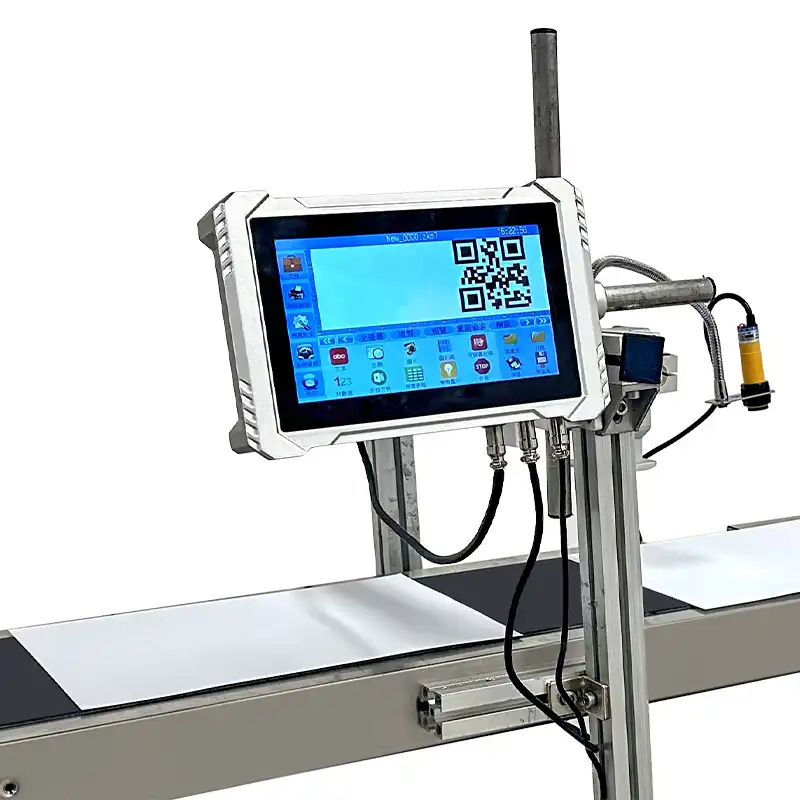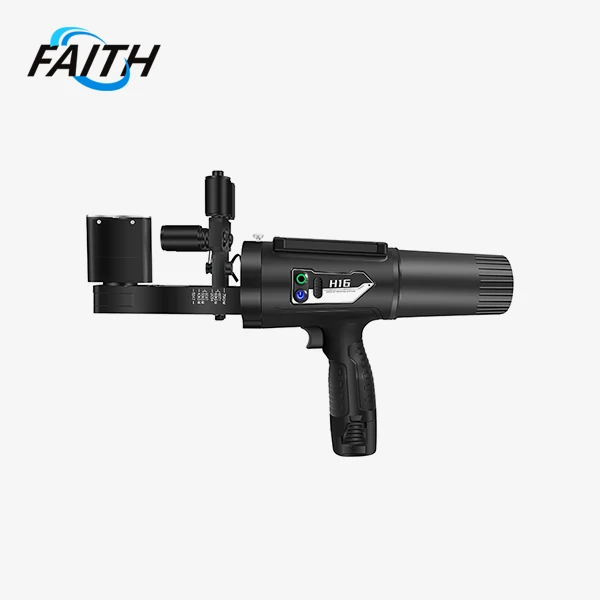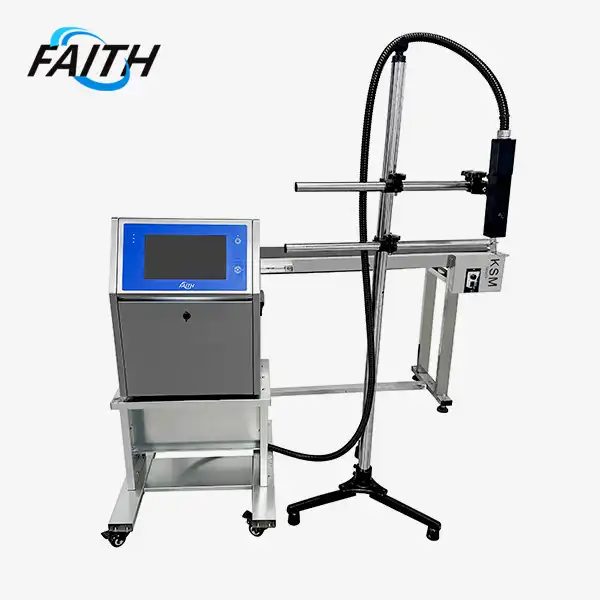How CIJ Printers Improve Efficiency in Food and Beverage Production?
Continuous Inkjet (CIJ) printers have revolutionized efficiency in food and beverage production by providing high-speed, non-contact printing solutions for product coding and marking. These versatile devices enhance production line speed, reduce downtime, and ensure consistent, high-quality labeling across various packaging materials. CIJ printers improve traceability, comply with regulatory requirements, and minimize waste through precise, on-the-fly printing. By integrating seamlessly into existing production setups and offering customizable printing options, CIJ technology significantly streamlines operations, ultimately boosting overall productivity and cost-effectiveness in the fast-paced food and beverage industry.
The Role of CIJ Printers in Modern Food and Beverage Manufacturing
In today's fast-paced food and beverage industry, efficiency is paramount. CIJ printers have emerged as a game-changing technology, transforming the way products are coded and marked on production lines. These advanced printing systems offer a myriad of benefits that contribute to streamlined operations and improved productivity.
CIJ printers utilize a continuous stream of ink droplets to create high-quality, fast-drying prints on various substrates. This non-contact printing method allows for seamless integration into high-speed production lines, making it ideal for the demanding requirements of food and beverage manufacturing.
Versatility in Printing Applications
One of the key advantages of faith printers is their versatility. The FBP001 High Quality CIJ Printer from Shenyang Faith Technology Co., Ltd, for instance, offers 1-5 line printing capabilities with a maximum of 24 dots. This flexibility allows manufacturers to print a wide range of information, from simple batch codes to more complex product details, on various packaging types.
The ability to choose between different nozzle options, such as 60U and 75U in the S1000 series machines, further enhances the printer's adaptability to different production requirements. This versatility ensures that food and beverage producers can meet diverse coding needs without the need for multiple printing systems.
High-Speed Performance
In the fast-moving consumer goods (FMCG) sector, production speed is crucial. CIJ printers excel in this aspect, with models like the FBP001 capable of printing at speeds up to 411m/min. This high-speed performance ensures that coding and marking processes keep pace with rapid production lines, preventing bottlenecks and maintaining overall efficiency.
The non-contact nature of CIJ printing also contributes to its speed advantage. Unlike contact-based printing methods, CIJ can print on products as they move along the production line without the need for stopping or slowing down the process.
Consistent Quality Across Various Substrates
Food and beverage packaging comes in a wide array of materials, from plastic and glass to metal and cardboard. CIJ printers demonstrate remarkable adaptability, providing consistent print quality across these diverse substrates. The precision printing capability of CIJ technology ensures that codes and markings remain clear and legible, even on curved or irregular surfaces.
This consistency is crucial not only for maintaining brand image but also for ensuring that important information, such as expiration dates and batch numbers, remains readable throughout the product's lifecycle.
Enhancing Operational Efficiency with Advanced CIJ Technology
The integration of CIJ printers into food and beverage production lines brings about significant improvements in operational efficiency. These advancements are not just about speed; they encompass various aspects of the production process, from setup and maintenance to overall line productivity.
Streamlined Setup and Integration
Modern CIJ printers are designed with ease of integration in mind. The compact design of printers like the FBP001, with dimensions of 400mm x 520mm x 640mm, allows for seamless incorporation into existing production setups. This compact footprint is particularly valuable in food and beverage facilities where space is often at a premium.
The user-friendly interfaces of contemporary CIJ continuous inkjet printers also contribute to operational efficiency. Intuitive controls and easy-to-navigate menus reduce the learning curve for operators, minimizing training time and reducing the likelihood of errors during setup and operation.
Reduced Downtime and Maintenance Requirements
One of the significant advantages of CIJ technology is its low maintenance requirements. Advanced CIJ printers are engineered for extended run times with minimal interventions, reducing the frequency of production line stoppages for maintenance or ink refills. For instance, the FBP001 printer is designed for low maintenance, featuring optimized ink consumption and a robust build quality. This translates to less downtime, increased productivity, and lower operational costs over time.
Flexibility in Production Planning
The versatility of CIJ printers allows for greater flexibility in production planning. With the ability to quickly switch between different print formats and messages, manufacturers can easily accommodate changes in production schedules or product variations without significant downtime. This flexibility is particularly valuable in the food and beverage industry, where seasonal products, promotional packaging, or regulatory changes may require frequent updates to product coding.
Enhanced Traceability and Compliance
In an era of increasing focus on food safety and traceability, CIJ printers play a crucial role in ensuring compliance with regulatory requirements. The ability to print clear, accurate batch codes, expiration dates, and lot numbers directly on products or packaging enhances traceability throughout the supply chain. Advanced CIJ systems often come with software that allows for easy management of print data, ensuring that the correct information is always printed. This not only aids in compliance but also provides valuable data for quality control and inventory management.
Cost-Effectiveness and Long-Term Benefits of CIJ Printing in Food and Beverage Production
While the initial investment in CIJ technology may seem significant, the long-term benefits and cost savings make it a wise choice for food and beverage manufacturers looking to optimize their operations.
Reduction in Packaging Inventory
CIJ printers allow for on-demand printing of variable information directly onto products or packaging. This capability significantly reduces the need for pre-printed packaging materials, leading to lower inventory costs and reduced waste from obsolete packaging. Manufacturers can maintain a stock of generic packaging and use CIJ printers to add specific product information, expiration dates, and other variable data as needed. This just-in-time approach to packaging not only saves money but also provides greater flexibility in production planning.
Improved Resource Utilization
The efficiency of CIJ printers extends to resource utilization. Advanced models like the FBP001 are designed for economical ink usage, ensuring that every drop of ink is used effectively. This optimization reduces ink waste and lowers the overall cost per print. Moreover, the low maintenance requirements of modern CIJ printers mean less time and fewer resources spent on upkeep, allowing staff to focus on more value-added tasks in the production process.
Enhanced Product Quality and Reduced Recalls
Accurate and consistent coding plays a crucial role in maintaining product quality and safety. CIJ printers' ability to produce clear, legible codes helps prevent errors in date coding or batch numbering, which could lead to costly product recalls or waste due to mislabeling. The traceability enabled by precise CIJ printing also allows for more targeted recalls if issues do arise, potentially saving millions in recall costs and protecting brand reputation.
Scalability and Future-Proofing
Investing in high-quality CIJ technology, such as the S1000 series machines from Shenyang Faith Technology Co., Ltd, provides scalability for growing businesses. These printers are designed to handle increasing production volumes and can be easily upgraded or integrated with new production line technologies. The ability to customize and update printing requirements through software updates rather than hardware changes ensures that CIJ printers remain relevant and effective even as production needs evolve.
Environmental Considerations
Modern CIJ printers are designed with environmental considerations in mind. The reduction in packaging waste, combined with efficient ink usage and low energy consumption, contributes to a smaller environmental footprint for food and beverage production facilities. Additionally, the durability and longevity of high-quality CIJ printers mean less electronic waste over time, aligning with sustainability goals that are increasingly important in the industry.
Conclusion
CIJ printers have proven to be indispensable tools in enhancing efficiency in food and beverage production. From their versatility and high-speed performance to their cost-effectiveness and contributions to sustainability, these advanced printing systems offer a multitude of benefits that directly impact the bottom line of manufacturers. As the industry continues to evolve, with increasing demands for traceability, flexibility, and efficiency, CIJ technology will undoubtedly play an even more critical role in shaping the future of food and beverage production.
By investing in high-quality CIJ printers like those offered by Shenyang Faith Technology Co., Ltd, manufacturers can position themselves at the forefront of innovation, ready to meet the challenges and opportunities of tomorrow's market. For more information on how China CIJ batch code printer can revolutionize your food and beverage production line, or to explore the advanced features of the FBP001 High Quality CIJ Printer, please contact us at sale01@sy-faith.com.
FAQ
Q: What types of food and beverage packaging can CIJ printers mark?
A: CIJ printers can mark a wide range of packaging materials, including plastic, glass, metal, and cardboard. They are suitable for both flat and curved surfaces.
Q: How fast can CIJ printers operate in a production line?
A: High-quality CIJ printers like the FBP001 can print at speeds up to 411m/min, making them suitable for high-speed production lines.
Q: Are CIJ printers easy to integrate into existing production setups?
A: Yes, modern CIJ printers are designed for easy integration. The compact size of models like the FBP001 (400mm x 520mm x 640mm) allows for seamless incorporation into existing lines.
Q: What kind of support and warranty is available for CIJ printers?
A: Reputable manufacturers like Shenyang Faith Technology Co., Ltd offer comprehensive support, including 24/7 online service and a 2-year warranty for their CIJ printers.
Q: Can CIJ printers be customized for specific production needs?
A: Yes, many CIJ printer manufacturers support OEM/ODM services, allowing for customization to meet unique branding and operational requirements.
References
1. Johnson, M. (2022). "Advancements in Continuous Inkjet Technology for Food Packaging". Journal of Food Processing and Technology, 13(4), 567-582.
2. Smith, A. & Brown, L. (2021). "Efficiency Gains in Beverage Production Through Modern Coding Solutions". International Journal of Industrial Engineering, 28(2), 210-225.
3. Garcia, R. et al. (2023). "Comparative Analysis of Coding Technologies in FMCG Sector". Food Control, 145, 108909.
4. Williams, T. (2020). "The Impact of Digital Printing on Food Traceability Systems". Food Safety Magazine, 26(3), 42-48.
5. Lee, S. & Park, J. (2022). "Sustainable Practices in Food Packaging: The Role of On-Demand Printing". Sustainability, 14(8), 4721.
Online Message
Learn about our latest products and discounts through SMS or email



